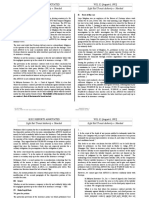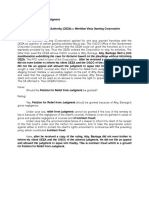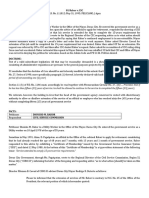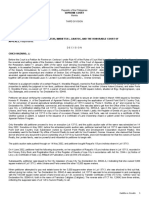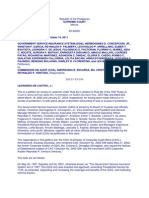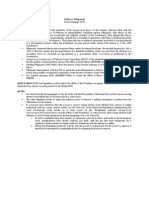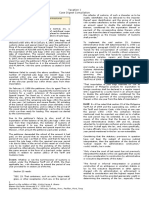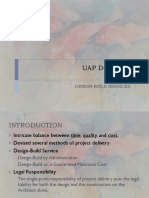(Digest) Gsis V CSC
(Digest) Gsis V CSC
Uploaded by
Julie Ann EnadCopyright:
Available Formats
(Digest) Gsis V CSC
(Digest) Gsis V CSC
Uploaded by
Julie Ann EnadOriginal Description:
Original Title
Copyright
Available Formats
Share this document
Did you find this document useful?
Is this content inappropriate?
Copyright:
Available Formats
(Digest) Gsis V CSC
(Digest) Gsis V CSC
Uploaded by
Julie Ann EnadCopyright:
Available Formats
GSIS v.
CSC
G.R. No. 98395 &
June 19, 1995
Kapunan
102449
petitioners GSIS
responden CSC and (1) Dr. Manuel Baradero, (2) Matilde Belo
Enad
ts
summary Respondents paid on a per diem basis. CSC ruled that such periods should be
considered creditable for computing their
purposes. GSIS and SC: not creditable,
Reconsidered. The per diem paid to them
service; nature of remuneration, not label, is
length of service for retirement
per Sec. 1(c), RA 1573. Held:
was actual compensation for their
controlling.
facts of the case (resolution)
Belo Vice-Gov of Capiz from 5 Jan 1972 1 Feb 1988.
+ From 31 Dec 1979 to 1 Feb 1988: held the position in a holdover capacity broken down into
2 periods1
(1) 31 Dec 1976 to 31 Dec 1979, where she was paid on a per diem basis reckoned on the
attendance in Board Meetings;
(2) 1 Jan 1980 to 1 Feb 1988, paid a fixed salary.
+ During holdover: served on a full time basis and was on call 24 hrs. a day.
+ CSC Resolution: services rendered for the 1 st holdover period was creditable for purposes of
retirement.
Baradero Sangguniang Bayan member of the Municipality of La Castellana, Negros
Occidental between 1 Jan 1976 10 Oct 1978, paid on a per diem basis.
+ Former army member and served as a medical officer of the Philippine Medicare
Commission.
+ Rendered full services to the government.
+ CSC Resolution: (Based on Belo) recognized the period served as SB mem as creditable for
retirement purposes instead of allowing him his petition for extension of service in order to
complete the 15-yr period of service required for the purpose of qualifying for retirement
benefits.
GSIS: per diems are not compensation within the meaning of Sec. 1(c), RA 1573 2.
SC Decision: Certiorari granted. Government service rendered on a per diem basis is not
creditable in computing the length of service for retirement purposes.
issue
WoN the GSIS is the proper government agency to determine what service is creditable for retirement purposes. YES.
But issue raised and discussed only in dissent.
WoN regular service in government on a per diem basis, without any other form of compensation
or emolument, is compensation within the contemplation of the term service with compensation
under the Government Service Insurance Act of 1987. YES.
1 Nalabuan din ako, sabi sa case 1979 onwards yung hold over tapos yung
pagbreakdown ng periods from 1976. Ewan ko haha.
2 (c) Salary, pay or compensation shall be construed as to exclude all bonuses, per
diems, allowances and overtime pay, or salary, pay or compensation given to the base
pay of the position or rank as fixed by law or regulations.
1
ratio
+ Even if what they received were denominated as per diem, the amounts received were
actually in the nature of a compensation or pay.
+ Test: Nature of the remuneration, not the label.
+ (Belo) The per diem she received was actually paid for in the performance of her duties
as VG of Capiz in a hold over capacity not as the per diem referred to in Sec. 1(c).
+ Legislative intent: Make a clear distinction between salary, pay or compensation vs. other
incidental allowances, including per diems.
+ GR: An allowance for expenses incident to the discharge of an office is not a salary of office.
Thus, if remuneration received by a public official in the performance of his duties does not
constitute a mere allowance for expenses but appears to be his actually base pay,
then no amount of categorizing the salary as per diem would take the allowances from the
term service with compensation for the purpose of computing the number of years of service in
government.
+ Per diem as used in the GSI Act: a daily allowance given for each day an officer or
employee of government is away from his home base.
- A reimbursement for extra expenses incurred by the public official in the performance
of his duties.
- Intended to cover the cost of lodging and subsistence of officers and employees when
they are on duty outside of their permanent station.
- BUT, in general, it could also be considered as compensation or remuneration
attached to an office.
- applies to Belo and Baradero.
+ Fact missed in the SC decision: Belo was subsequently paid a fixed salary, which apparently
rectified an otherwise anomalous situation.
+ Retirement benefits are in effect rewards for the government employees for giving
the best years of their lives to the service of the country. Basis for provision of retirement
benefits = service to government.
While a government insurance system is partly
dependent on contributions made by the members, the fact that these contributions are minimal
when compared to the amount of retirement benefits actually received shows that such
contributions, while necessary, are not absolutely determinative in drawing up criteria for those
who would qualify as recipients of the retirement benefit system.
+ Argument: They cannot avail themselves of the benefits of the policy because no
deductions were made from their salaries during the disputed periods.
SC: (Belo) She was not duly informed that the short period was not to be credited in
computing the length of her service for retirement purposes. She assumed all in good faith that
she continued to be covered by the GSIS insurance benefits considering that the deductions are
virtually mandatorily made from all government employees on an essentially involuntary basis.
(Baradero) If he had been informed of the need to pay the required deductions, he would
have willingly paid the required sums.
- The contract between the GSIS and the government employee is done on a take-it-orleave-it basis = a virtual contract of adhesion which gives the employee no choice but
to involuntarily accede to the deductions made from their oftentimes meager salaries.
+ Source of GSIS benefits not in essence merely contractual, but also a social
legislation clearly indicated in the whereas clauses of PD 1146 3.
3 WHEREAS, provisions of existing laws that have prejudiced, rather than benefited, the government employee; restricted, rather than
broadened, his benefits, prolonged, rather than facilitated the payment of benefits, must now yield to his paramount welfare;WHEREAS, the
social security and insurance benefits of government employees must be continuously re-examined and improved to assure comprehensive
and integrated social security and insurance programs that will provide benefits responsive to their needs and those of their dependents in the
event of sickness, disability, death, retirement, and other contingencies; and to serve as a fitting reward for dedicated public service;
WHEREAS, in the light existing economic conditions affecting the welfare of government employees there is a need to expand and improve the
social security and insurance programs administered by the Government Service Insurance Systems, specifically, among others, by increasing
pension benefits, expanding disability benefits, introducing survivorship benefits, introducing sickness income benefits, and eventually
extending the compulsory coverage of these programs to all government employees regardless of employment status.
+ Situation can be rectified by deducting a reasonable amount corresponding to the
contributions which should have been deducted from the retirement benefits.
- Grossly inequitable to permanently penalize them by ignoring the fact of actual period
of service to government with compensation, and deny them the retirement privileges
that they justly deserve.
QUIASON DISSENT
+ Raised a third issue: WoN respondents may avail of retirement benefits notwithstanding his
failure make contributions to the GSIS for the duration he was receiving per diem as
compensation.
+ First issue: GSIS has the power to determine what service is creditable, as PD 1146 vests
such power to it.
+ Second issue: The nomenclature given to the basic salary paid a government employee is
not controlling in determining the service that is creditable for retirement purposes; what is
important is that the pay is given for full time work.
+ Third issue: The obligation to pay premiums is equally essential as the period of
services rendered.
- Prior to LGC, LGUs were not compulsorily covered by the GSI Act (RA 186). However,
RA 1573, amending RA 186, allowed the optional coverage under the government insurance
system, subject to certain requirements 4.
- Belo never became a GSIS member during her term as VG, nor did she contribute
to the System. She had an option of continuing her membership by complying with the
requirements in Sec. 4(b), but she failed to do so.
+ GSIS only obligated to grant retirement benefits to its members. Obligation exists where
there is a contract of life or retirement insurance between GSIS and the government employee,
as evidenced by a GSIS policy.
+ Premiums payable by the members are the lifeblood of the retirement scheme.
- Unjust for Belo to compel GSIS to grant her the benefits when she never remitted the
employers and her share of contributions for the disputed period.
- Would result in an inequitable situation where GSIS is exposed to a risk without the
benefit of receiving any contribution or premium.
- Only fair that GSIS be entitled to payment of premiums as soon as it is exposed to the
risk ensured against, whether it be life or annuity insurance.
+Most liberal application of ruling: Limit it to cases where the retiree has paid the
corresponding retirement premiums during said period.
4 (1) the employee notifies the System in writing; (2) the employee complies with the
requirements of the System and that he is in government service when the insurance
takes effect; and (3) after his admission, the employee shall be eligible to either life or
retirement insurance benefits, or to both, for which the rates of the premiums or
contributions shall be paid by him, including the share otherwise payable by his
employer (Sec. 4[b]).
3
You might also like
- 108 New Sun Valley Homeowners Assoc. v. Sangguniang BarangayNo ratings yet108 New Sun Valley Homeowners Assoc. v. Sangguniang Barangay3 pages
- Real Property Covering Seven Parcels of Land in Favor of Her Niece Ursulina Ganuelas (Ursulina)No ratings yetReal Property Covering Seven Parcels of Land in Favor of Her Niece Ursulina Ganuelas (Ursulina)4 pages
- Madreo v. Bayron, November 3, 2020 (Condonation Doctrine and Recall Election) by LasacaNo ratings yetMadreo v. Bayron, November 3, 2020 (Condonation Doctrine and Recall Election) by Lasaca4 pages
- 1 Cagayan Economic Zone Authority (CEZA) v. Meridian Vista Gaming CorporationNo ratings yet1 Cagayan Economic Zone Authority (CEZA) v. Meridian Vista Gaming Corporation1 page
- G.R. No. 201785 - DIAMOND DRILLING CORPORATION OF THE PHILIPPINES, PETITIONER, v. CRESCENT MINING AND DEVELOPMENT CORPORATION100% (1)G.R. No. 201785 - DIAMOND DRILLING CORPORATION OF THE PHILIPPINES, PETITIONER, v. CRESCENT MINING AND DEVELOPMENT CORPORATION3 pages
- Fidencio Y. Beja, SR., Vs - Court of Appeals: Beja Elevated The Case To The SC, Challenging The Legality ofNo ratings yetFidencio Y. Beja, SR., Vs - Court of Appeals: Beja Elevated The Case To The SC, Challenging The Legality of2 pages
- NORA B. CALALANG-PARULAN AND ELVIRA B. CALALANG Vs - ROSARIO CALALANG - GARCIANo ratings yetNORA B. CALALANG-PARULAN AND ELVIRA B. CALALANG Vs - ROSARIO CALALANG - GARCIA3 pages
- Political Law Review (Pre-Midterm) 1 of 2No ratings yetPolitical Law Review (Pre-Midterm) 1 of 268 pages
- National Investment and Development Co. v. de Los Angeles (1971)100% (1)National Investment and Development Co. v. de Los Angeles (1971)2 pages
- The Provincial Government of Camarines Norte Vs GonzalesNo ratings yetThe Provincial Government of Camarines Norte Vs Gonzales3 pages
- Presidential Ad Hoc Fact-Finding Committee On Behest Loans vs. Desierto, 317 SCRA 272, October 25, 1999No ratings yetPresidential Ad Hoc Fact-Finding Committee On Behest Loans vs. Desierto, 317 SCRA 272, October 25, 19992 pages
- Feliciano & Gonzales vs. DND (Admin Law December 10)No ratings yetFeliciano & Gonzales vs. DND (Admin Law December 10)2 pages
- Spinning and Weaving Discontent: Labour Relations and The Production of Meaning at Zambia-China Mulungushi Textiles100% (1)Spinning and Weaving Discontent: Labour Relations and The Production of Meaning at Zambia-China Mulungushi Textiles27 pages
- Endorsements and Various Types of Endorsements100% (1)Endorsements and Various Types of Endorsements5 pages
- Art. 1345. Simulation of A Contract May Be Absolute or Relative. The Former Takes PlaceNo ratings yetArt. 1345. Simulation of A Contract May Be Absolute or Relative. The Former Takes Place4 pages
- Song Fo v. Hawaiian Philippines, 47 Phil 821 (1925)100% (1)Song Fo v. Hawaiian Philippines, 47 Phil 821 (1925)5 pages
- The Maharashtra Ownership Flats Act, 1963 (45 of 1963) Pdfcompressor-2856906No ratings yetThe Maharashtra Ownership Flats Act, 1963 (45 of 1963) Pdfcompressor-285690620 pages
- 059-Chavez v. NLRC, G.R. No. 146530, Jan 17, 2005No ratings yet059-Chavez v. NLRC, G.R. No. 146530, Jan 17, 20058 pages
- CA Inter Accounts Suggested Answer Nov 2022No ratings yetCA Inter Accounts Suggested Answer Nov 202229 pages
- 6 Republic vs. Asiapro Cooperative, GR No 172101, Nov. 23, 2007No ratings yet6 Republic vs. Asiapro Cooperative, GR No 172101, Nov. 23, 200716 pages
- University of Dhaka Department of Accounting & Information Systems Master of Professional Accounting (MPA) ProgramNo ratings yetUniversity of Dhaka Department of Accounting & Information Systems Master of Professional Accounting (MPA) Program13 pages
- Mukhtyar Singh Vs Food Corporation of India and Ors. On 8 August, 1992No ratings yetMukhtyar Singh Vs Food Corporation of India and Ors. On 8 August, 19927 pages
- SAP Contract and Lease Management (SAP RE-FX) - FAQ NoteNo ratings yetSAP Contract and Lease Management (SAP RE-FX) - FAQ Note14 pages















